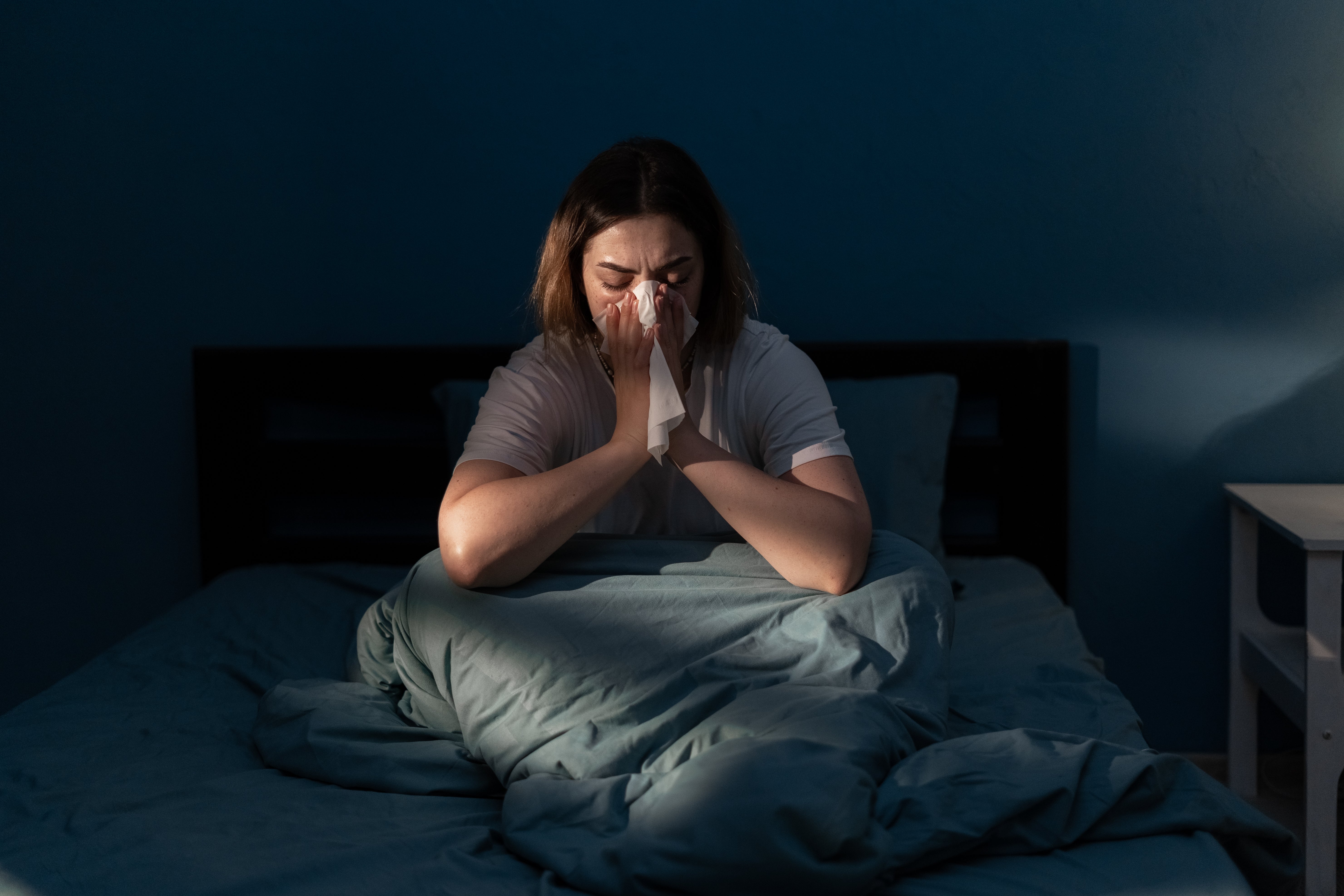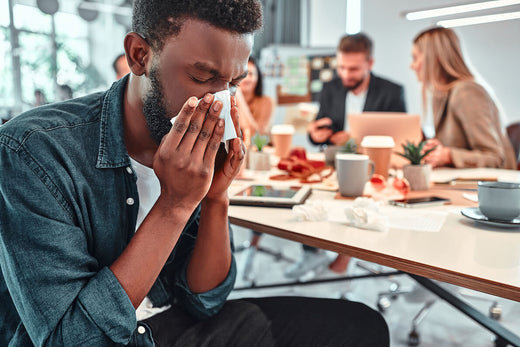
How Long Does Allergy Medicine Take to Work?
Allergy medicines don’t all work the same. Some start easing symptoms within minutes, while others take weeks or even months before you notice significant relief. Understanding these differences can help you choose the right treatment for lasting relief.
Allergy medications can take anywhere from a few minutes to several months to work. (1, 2) However, the duration of these effects depends on the allergy medicine. Antihistamines, for example, are intended for short-term symptom relief, while immunotherapies (allergy shots or allergy drops) are for longer-term control over allergies. (3)
Rating Allergy Medications by How Fast They Work
There are various allergy medications available to manage common allergy symptoms, including nasal congestion, watery eyes, fatigue, sore throat, itchy or red eyes, and poor sleep patterns.
Some commonly used allergy medicines from the fastest-acting include:
-
Antihistamines: There are oral and nasal spray antihistamines available without a prescription to help you manage some allergy symptoms, such as sneezing, itching, nasal congestion, or watery eyes. Examples of antihistamines include cetirizine (Zyrtec), loratidine (Claritin, Alavert), and fexofenadine (Allegra).
-
Decongestants: Nasal decongestants help relieve a stuffy nose or sinus congestion. Examples include pseudoephedrine (Sudafed), oxymetazoline (Afrin), and phenylephrine spray (Neo-Synephrine). Some medicines combine both decongestants and antihistamines into the same pills, such as Allegra-D (fexofenadine/pseudoephedrine).
-
Nasal Steroids: Nasal steroids can help reduce nasal inflammation, sneezing, and nasal congestion. Some OTC nasal steroids available include triamcinolone (Nasacort), fluticasone propionate (Flonase), and mometasone (Nasonex).
-
Mast cell stabilizers: It is prescribed to manage symptoms of allergic rhinitis and asthma caused by allergies. Examples include cromolyn (NasalCrom). It is a second-line treatment, meaning doctors prescribe it when other allergy medicines do not work.
-
Allergy shots: This is a long-term treatment used to decrease your sensitivity to allergens. (4) Allergy shots are injected under the skin to help reduce symptoms in people with allergic rhinitis, eye allergy (conjunctivitis), and seasonal allergies
-
Allergy drops: Allergy drops are also a long-term treatment and can be personalized to manage your symptoms. (5) However, this treatment is administered orally (under the tongue) rather than injected. At Quello, we offer free allergy testing to identify your specific allergies before creating allergy drops tailored to your needs.
The best type of allergy medicines for you may depend on your specific symptoms, side effects, symptom duration, response to previous treatment, and personal preference. Often, the best solution can be a combination of different options, giving the best of short and long-term relief.

How Long Does Allergy Medicine Take to Work?
Allergy medications can take anywhere from a few minutes to several months to show desired improvements in symptoms.
Decongestants
Some decongestants work almost instantly, within 5 to 10 minutes, to provide relief from a stuffy nose. (2) However, nasal decongestant sprays, such as oxymetazoline, should be used with caution. (6)
While effective, they are only intended for short-term use (not more than 3-5 days). Prolonged use may lead to a condition known as rebound congestion or rhinitis medicamentosa. (7) This means, instead of getting relief, your nose becomes more congested the more you use decongestant sprays, and you have to use them more frequently, creating dependence. (7) If you do not get relief after three days of using decongestants, consult your healthcare provider immediately.
Antihistamines
Antihistamines, in general, can take work within a few minutes to a few hours to work, depending on the dosage form. Oral antihistamines can begin to take effect within 30 minutes of administration, but the full effect typically occurs in 1 to 2 hours. (8) Some antihistamine nasal sprays work much faster, with allergy relief being seen in as little as 15 minutes. (9)
However, the effect of antihistamines for allergy is short-lived. Some work for only 4 to 6 hours, while others last longer (between 12 to 24 hours). (10)
Nasal Steroids
Nasal steroids, such as fluticasone, are often the first medications your healthcare provider would prescribe to manage mild to moderate allergy symptoms. (11)
It may take up to two weeks for you to get the full benefits of nasal steroids. However, your symptoms may begin to improve 1 to 2 days after your first spray. (12) Keep in mind that nasal steroids only offer relief but do not cure allergies.
Mast cell stabilizers
Mast cell stabilizers, like cromolyn, don’t work as well as other allergy medicines for easing symptoms because they help prevent allergic reactions rather than give quick relief. (13) It may also take up to four weeks for the effects of mast cell inhibitors to be seen. (14) Keep in mind, these medications do not treat symptoms that have already begun.
Allergy shots
These treatments are administered to stop or reduce allergy symptoms and a full treatment course takes around 4 years (1) Treatment is divided into two main phases: the build-up, which lasts approximately 3 to 9 months, and the maintenance phase, which typically continues for around 3 more years . (1, 4)
Allergy shots are not intended to provide immediate relief. (4) It may take up to a year to feel some relief, but most people notice clear improvement in their allergy symptoms by the second year. (1, 4) Some people can live symptom-free or with minimal symptoms for up to 20–25 years after treatment stops.
That said, there’s a risk of rare but life-threatening allergic reaction called anaphylaxis that could occur with allergy shots.
Allergy Drops
Allergy drops can help reduce reliance on allergy medications; however, treatment typically lasts between around 4 years. The prolonged treatment time is due to the need to train the immune system not to overreact to an allergen. There are also two phases of treatment, just like with allergy shots.
Most people notice an improvement in three to four months after using allergy drops as directed. (15) At Quello, we have allergists who follow up with our patients and adjust doses as needed.
Your tolerance to allergens can be sustained for up to 20 to 25 years after you stop taking allergy drops once you have completed the 4-week program. (15)
Compared to allergy shots, reactions with drops are much milder and typically include an itchy mouth or worsening of existing allergy symptoms.

Factors Affecting How Quickly Allergy Medicine Works
Some factors that may affect how quickly you notice a relief in your symptoms following allergy medications include:
-
The type of medication: Some medications work faster than others. Decongestants, for example, tend to provide relief faster than mast cell inhibitors.
-
The dosage used: Higher doses of allergy medications may provide relief faster, but the risk of side effects may be higher.
-
Individual differences: Metabolism plays a role in how you react to allergy medicines. People with faster metabolism might experience medication effects more quickly, but the relief might not last.
-
Consistency in treatment: If you are aiming for long-term relief or want protection against a pollen season, consistency might affect how quickly you see a result.
-
High levels of allergens in the environment: The higher the level of pollen allergens or indoor allergens you are exposed to, the less likely you are to see relief in your symptoms.
-
Constant exposure to other triggers: Similarly, being constantly exposed to triggers like smoke or air pollution might worsen your symptoms, making relief more difficult.

When to Start Allergy Medications for Seasonal Relief
The best time to start allergy medications may be a few weeks or months before an allergy season starts, especially for preventive treatments. (10) For example, if you are more sensitive to tree pollen allergens (common in the spring), starting treatment in the winter may better protect you.
However, at Quello, we give allergy drops year-round to train your immune system not to overreact to allergens from any season. For patients pursuing this solution, remember that immune system retraining takes time, and allergy drops should be used alongside other solutions to achieve the best results.

Retrain your immune system to respond better to allergens with Quello.
Our goal at Quello is to make sure you live as allergy-free as possible. Our allergy drops are designed to address the specific allergens your body reacts to. Our allergists may also prescribe other fast-acting allergy medicines to address any immediate concerns.
Most of our customers experience relief a few weeks into treatment, and after a few years, many can live allergy-free or with minimal symptoms.
Ready to overcome your allergies? Get started with Quello allergy drops today!
Overcome your allergies at home with our doctor-led therapy.
Get started with our free allergy test kitGet Started with no test needed.
Overcome your allergies at home with our doctor-led therapy.
Get started with our free allergy test kitGet Started with no test needed.




